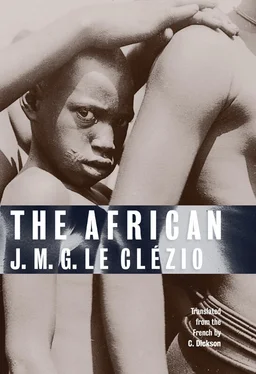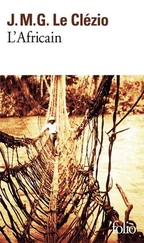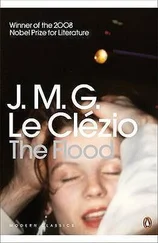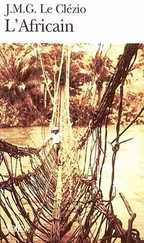Was it the war — that interminable silence — that had made my father into that pessimistic and cranky authoritative man whom we learned to fear rather than love? Was it Africa? Then which Africa? Certainly not the one we see today, in literature or in films, boisterous, unruly, juvenile, informal, with its villages run by matrons, its storytellers, the Africa in which one can constantly witness the admirable will to survive in conditions that would seem insurmountable to inhabitants of more privileged regions. That Africa already existed before the war, there’s no doubt about that. I try to imagine Douala, Port Harcourt, the streets packed with cars, the markets where children gleaming with sweat run, groups of women talking in the shade of the trees. The large cities, Onitsha and its paperback book market, the rumbling of boats pushing logs upriver. Lagos, Ibadan, Cotonou, intermingling of all sorts, of people, of languages, the humorous, stereotypical side of colonial society, the businessmen dressed in suits and hats, impeccably folded umbrellas, the stifling salons where Englishwomen in low-cut dresses sit fanning themselves, the terraces of clubs where agents from Lloyd’s, from Glyn Mills, from Barclays smoke their cigars, exchanging comments about the weather — It’s a tough country, old chap — and the servants in tailcoats and white gloves silently make the rounds carrying cocktails on silver trays.
My father told me one day how he had decided to go to the other end of the world when he’d finished his medical studies at Saint Joseph’s Hospital in Elephant and Castle, London. Since he’d received a government scholarship, he was expected to go to work for the community. He was therefore assigned to the tropical diseases ward at the Southampton Hospital. He takes the train, gets off at Southampton, rents a furnished room, a letter is awaiting him there, a very curt note from the head of the hospital saying, “Sir, I have yet to receive your calling card.” My father has the cards in question printed up (I still have one of them), just his name, no address, no title. And he asks to be transferred to the Ministry of the Colonies. A few days later he’s on board a boat heading for Georgetown, in Guiana. With the exception of a few short vacations, for his marriage and later for the birth of his children, he didn’t return to Europe until the end of his professional career.
I tried to imagine what his life (and therefore mine) might have been if, instead of fleeing, he’d accepted the authority of the head of the Southampton Clinic and become a country doctor on the outskirts of London (just as my grandfather had been on the outskirts of Paris), in Richmond for example, or even in Scotland (a country he’d always loved). I don’t mean to evoke the changes it might have meant for his children (for being born here or there isn’t really of any importance in the end). But rather what it would have changed about the man himself, to have lived a more conventional, less solitary life. To have treated colds and constipation, rather than leprosy and malaria or lethargic encephalitis. To have learned to communicate, not in that singular fashion, with gestures, with interpreters, or in that rudimentary language known as pidgin English (nothing in common with the very refined, mystical Creole of Mauritius), but in everyday life, with completely ordinary people who make you one of them, who make you part of a city, of a neighborhood, of a community.
He had chosen something else altogether. Out of pride probably, to flee the mediocrity of British society, out of a desire for adventure too. And there was a price to pay for that something else. It plunged you into a different world, swept you away to another life. It condemned you to exile when war broke out, caused you to lose your wife and children, and in a certain way, inevitably made a stranger out of you.
The first time that I saw my father, in Ogoja, it seemed to me he was wearing a pince-nez. What makes me think that? The pince-nez was already rather old-fashioned in that day. Maybe a few old codgers in Nice had held on to that accessory, which — I believed — perfectly suited ex-officers of the Russian Imperial Army sporting mustaches and sideburns, or else the type of bankrupt inventors who were friends of my “aunts.” Why him? In reality, my father must have worn the type of glasses that were in style in the 1930s, steel-rimmed frames and round lenses that reflected the light. The same kind I see in portraits of men of his generation. Louis Jouvet or James Joyce (whom he slightly resembled for that matter). But an ordinary pair of glasses wasn’t enough for the image of that first meeting that stuck in my mind, his oddness, the hard look in his eyes, emphasized by the two vertical creases between his eyebrows. The English, or rather British aura about him, the stiffness of his dress, a sort of rigid armor that he’d donned once and for all.
I believe that in the hours following my arrival in Nigeria — the long dirt road from Port Harcourt to Ogoja in the driving rain, sitting in the gigantic, futuristic Ford V8 that didn’t resemble any other known vehicle — it wasn’t Africa that had been a shock to me, but discovering that odd, unfamiliar, possibly dangerous father. Could my father, my real father have worn a pince-nez?
His authoritativeness immediately posed a problem. My brother and I had lived in a sort of blissful anarchy almost totally devoid of discipline. The little authority we’d been confronted with came from my grandmother, a refined and generous old lady who was fundamentally opposed to all forms of corporal punishment for children, preferring instead to employ reason and gentleness. During his childhood in Mauritius, my maternal grandfather had been raised with stricter principles, but his advanced age, the love he bore my grandmother, and that sort of phlegmatic aloofness peculiar to heavy smokers kept him shut away in a small cubbyhole in which he’d lock himself to be able to smoke his Caporal in peace.
As for my mother, she was full of imagination and charm. We loved her, and I suppose our mischievousness made her laugh. I don’t remember having ever heard her raise her voice. Consequently, we had carte blanche to establish a reign of infantile terror in the small apartment. In the years that preceded our departure for Africa we did things that, with the hindsight of age, actually seem pretty awful to me: one day, goaded on by my brother, I scaled the railing of the balcony (I can still see it, quite a bit over my head) to climb up on the gutter overlooking the whole neighborhood from six floors up. I think my mother and grandparents were so frightened that — once we’d consented to come back in — they forgot to punish us.
I also remember being seized with temper tantrums because I’d been refused something, a sweet, a toy — in a word, for such trivial reasons I can’t even remember them. I would be filled with so much anger I would throw whatever I could get my hands on out the window, even furniture. At times like that, nothing and no one could calm me down. Sometimes I can call up the feelings of those fits of rage, I believe it’s something similar to being inebriated on ether (ether was given to children to inhale before extracting their tonsils). The complete loss of control, that feeling of floating, and at the same time of being extremely lucid. It was back in the days when I was also subject to violent headaches sometimes so unbearable that I had to hide under the furniture to escape the light. Where did those attacks come from? Today it seems to me that the only explanation would be the anxiety of the war years. A closed, dark, hopeless world. The wretched food — the black bread that people said was mixed with sawdust, and that almost caused my death at the age of three. The bombing of the harbor in Nice that flung me to the floor of my grandmother’s bathroom, that unforgettable feeling of the floor falling out from under my feet. Or still yet the ulcer on my grandmother’s leg, which had grown worse with the shortages and the lack of medicine; I’m in the mountain village where my mother has gone to hide due to my father being in the British army and the risk of her being deported. We are standing in line in front of the food store and I’m watching the flies alighting on the open wound on my grandmother’s leg.
Читать дальше












